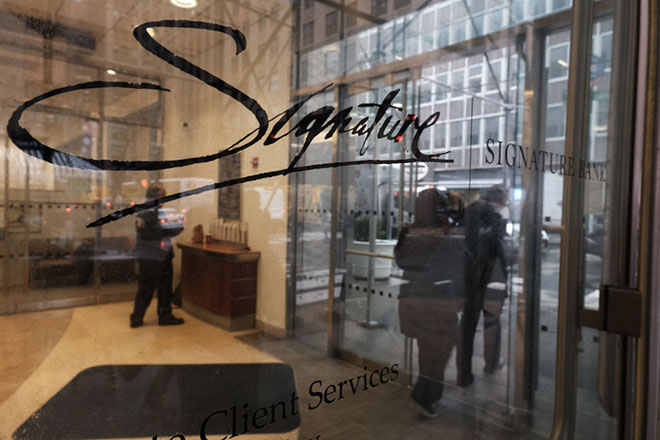Featured Topics
Featured Products
Events
S&P Global Offerings
Featured Topics
Featured Products
Events
S&P Global Offerings
Featured Topics
Featured Products
Events
S&P Global Offerings
Featured Topics
Featured Products
Events
Financial and Market intelligence
Fundamental & Alternative Datasets
Government & Defense
Professional Services
Banking & Capital Markets
Economy & Finance
Energy Transition & Sustainability
Technology & Innovation
Podcasts & Newsletters
Financial and Market intelligence
Fundamental & Alternative Datasets
Government & Defense
Professional Services
Banking & Capital Markets
Economy & Finance
Energy Transition & Sustainability
Technology & Innovation
Podcasts & Newsletters
25 Apr, 2023

By Yizhu Wang

|
The failure of Signature Bank and the liquidation of Silvergate Capital Corp. eliminated two of the leading crypto-friendly banks that had explored blockchain applications in banking. |
The myth that blockchain-enabled payments are exclusively tied to cryptocurrency is making it more difficult for the networks to realize greater adoption.
Blockchain-enabled payments had been gaining traction in the crypto world and bolstered growth at some banks. In February, the technology vendor Tassat Group Inc. said its total transaction volume since inception in 2019 surpassed $1 trillion, but that included the volume of Signature Bank's platform Signet, which is now under Federal Deposit Insurance Corp. receivership and no longer serving its main user base of crypto firms. The activity should fall significantly with the failure of Signature Bank and the liquidation of Silvergate Capital Corp., two of the leading crypto-friendly banks that had explored blockchain applications in banking.
There are other ways to deploy the technology. Banks have been looking to use blockchain to process payments for other industries and have made some inroads in sectors such as cargo shipping and payroll processing. But getting more acceptance is now challenged by the perceived link between crypto and blockchain.
"There is a lot of negative connotation today where people are putting blockchain and crypto in the same boat, and the two are very different things," said Chirag Bhavsar, president of Cogent Bank, which announced a blockchain-enabled platform in January 2022 developed by Tassat Group.
|
Proponents believe that blockchain technology can make payments faster and safer since ledgers of transactions are updated in real time and cannot be changed.
"The true value of blockchain technology is that it is a distributed, record-keeping ledger tool that's immutable," said John Beccia, CEO of financial technology advisory firm FS Vector.
But given the negative association with crypto, the pace to adopt blockchain has slowed at some banks. SouthState Bank NA, a unit of SouthState Corp., previously aimed to enter a pilot program in 2023 to test blockchain payments, but it has now decided to reassess the decision, said Chris Nichols, director of capital markets at SouthState Bank.
"We still see a clear use case, but we now believe we have more time and will not try to get ahead of the regulators or competition," Nichols said.
The blockchain and crypto link
The association between blockchain and cryptocurrency originates in how all blockchain networks execute payments. Those networks typically use cryptographic tokens to represent the value of the banks' deposits so that those tokens can be transferred on blockchain.
Banks have argued that the tokens serving as a payment medium should be treated differently by regulators than crypto like
In a December proposal, the FDIC defined crypto assets as "any digital asset implemented using cryptographic techniques" and proposed to add crypto assets to the definitions of "non-deposit products." It created concerns from banks investing in blockchain-enabled payments because it called into question whether funds sent by a bank over a blockchain network can be marketed as FDIC-insured to end customers.
The USDF Consortium, a group of nine banks aiming to transfer value via tokenized deposits on blockchain, urged the FDIC to clarify that tokenized deposits can qualify for FDIC insurance, according to a comment letter dated April 7.
"After all, products like USDF already require notification to the FDIC according to its interpretative guidance. The impact of an overbroad definition will deter banks from leveraging blockchain technology to improve traditional bank deposit payment services," the USDF Consortium wrote.
The USDF Consortium recently switched to a private blockchain from a public one to address regulators' concerns, and it has been waiting for regulatory approval to take it live.
The member banks of USDF Consortium maintain a long-term commitment to explore blockchain applications in banking despite recent volatility, Rob Morgan, CEO of the USDF Consortium, said in an interview. Morgan noted that management teams have been "focused on different things" of late, "but that doesn't change the long-term belief in the importance of blockchain to power the future of financial services."
Targeting a new audience
Ryan Zacharia, managing partner at JAM FINTOP, a member of the USDF Consortium, echoed the notion that tokenized deposits are not tied to any one industry but are "more about making the back-end payment infrastructure for banks more efficient."
Banks — including Signature when it was in operation — have been shrinking their relationships with crypto companies and aiming to use the blockchain-enabled payment networks with other customers.
"We've created over 20 use cases for our private permissioned blockchain technology, the largest being shipping, cargo, logistics, private equity capital calls and more," Kevin Greene, chairman and CEO of Tassat, wrote in an email.
Although the technology is available, Cogent Bank sees the commercial challenge to grow its blockchain payment network outside of crypto verticals because there are other payment options having better adoption or more regulatory clarity that will do the job, and some of those also support real-time payments, albeit not yet 24/7.
"What Tassat offers can be done with or without blockchain today," Bhavsar noted. "To me, it's not necessarily about blockchain as much as it is about real-time payments."
The Orlando, Fla.-based Cogent Bank initially planned to use the blockchain payment platform to seek crypto clients but soon found it hard to compete against Signature and Silvergate. The bank eventually paused its outreach to crypto firms in late 2022 due to market disruptions and regulatory uncertainties.
SouthState is also executing a broader strategy of real-time payments. With The Clearing House's RTP network and the upcoming rollout of the FedNow Service, adding a blockchain rail is not a big priority, Nichols said.
Convincing a wide swath of companies to use blockchain will not happen overnight, according to Bhavsar.
"But I do believe the technology is there to be able to do this," Bhavsar said. "I think eventually, this type of payment platform will be the norm, whether it's a government-sponsored network or not."